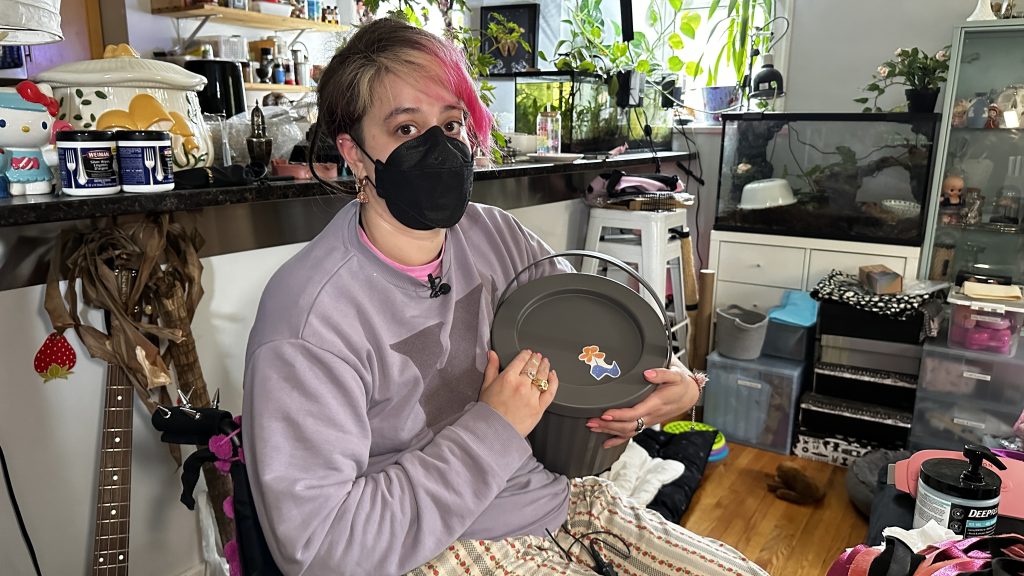Winnipegger calls for improved accommodations for patients who cannot verbally communicate at the hospital

Posted June 6, 2024 4:36 pm.
Last Updated June 7, 2024 11:36 am.
Going to the emergency room these days is often an extremely stressful situation for many. For some, it’s also a situation that leaves them unable to speak.
For one Winnipegger, the experience has left them calling for improved accommodations for people who cannot verbally communicate when they’re at the hospital.
“If my care is the ‘standard of care’, we have no standard of care,” said Ward Turnbull-Innis.
They 31-year-old wasn’t always in a wheelchair. Diagnosed with Ehlers-Danlos Syndrome, digestive issues and a distended bladder, their condition deteriorated rapidly in April.
“Before, my life was really active. I did a lot of going out. I liked going out with my friends. I’m a social person. I love being outside.”
Now, Turnbull-Innis can’t even make it to any of the bathrooms in their condo.
“I have a pee bucket … I bought a bucket from Ikea that lives by my couch,” they explained.

Since the middle of May, they’ve been to emergency rooms in the city at the request of their doctor — three times at HSC and once at St Boniface — to try and get care for their pain and get referrals to a neurologist and urologist. Turnbull-Innis is also autistic, and the stressful situation rendered them non-verbal. They say healthcare staff refused to accommodate them, trying to force them to speak and putting them in more distress.
“I was definitely far more dismissed. People weren’t listening to me. Even when I was communicating, even when I went in with a full list of, these are all my meds, this is my doctor, I’m autistic, please be patient with me … I did everything I could in advance knowing that it was gonna be bad,” explained Turnbull-Innis.
CityNews reached out to Shared Health and the Winnipeg Regional Health Authority for a comment.
“Health Sciences Centre is committed to providing an accessible and welcoming environment to the diverse patient population that receives care in our hospital. All staff are required to complete the Accessible Information and Communication Standard training which informs health-care workers of their obligations under the Accessibility for Manitobans Act,” said Shared Health in a statement.
“In instances where a patient has specific communication needs and does not have a support person present to assist them, tools such as whiteboards or flip cards are currently used in some areas of the hospital. We are currently exploring how to expand their use into the emergency department.”
The Winnipeg Regional Health Authority responded by saying, “Our expectation is that all patients, clients and residents are treated with respect, while ensuring their care needs, which includes removing barriers and providing accommodations for communication, are met.
“If a patient, client or resident feels they were not accommodated with their communication needs, we encourage them to reach out to WRHA Patient Relations to have their concerns addressed,” read the WRHA statement.
“To be told, I don’t believe you. Autism doesn’t make you go mute. No, we can’t accommodate you. No, you can’t text us. No, you can’t write. I don’t know how they think they will accommodate anybody who doesn’t speak English, who cannot communicate verbally,” said Turnbull-Innis.
They say healthcare staff need to be more accommodating of people’s needs in communication, and equipped with measures to ensure people who cannot speak can still get the care they need. Above all else, they say staff need to listen to patients and take them seriously when they say they need to communicate differently.
“Easy solution: laminated card with some basic, like, what’s your pain scale. What are you here for today. Those things.”
For now, Turnbull-Innis continues to manage their symptoms as they wait to hear back from referrals made at the hospital. They’re hoping that, once they’re able to see the specialists they need, they can be able to get back into a physical condition that will allow themselves to get back on their bike.
“Maybe by October, November, (I can) be back on my bike. It’s over there. I love it. I’ve had the same bike since I was 15. I’ve had that bike more than half my life.”

“Riding my bike always feels more achievable (than walking). It gives me a sense of freedom. Sitting on my couch, staring at the ceiling, I’m really glad I have memories of riding 95 kilometres. That I can think about that and think, yeah, I did that. I’m not always like this. This is just temporary,” said Turnbull-Innis.
They’re hoping changes are made to the healthcare system soon, to ensure nobody else has the same experiences.
“I am disillusioned. I’m so frustrated. I’m so sad. I just want to be heard.”








